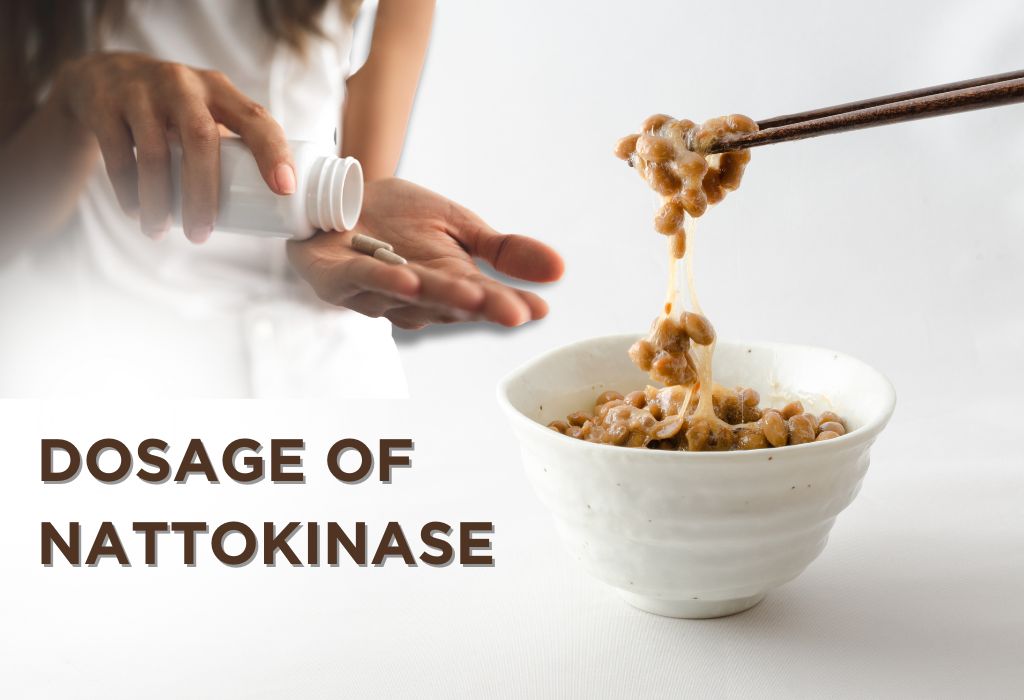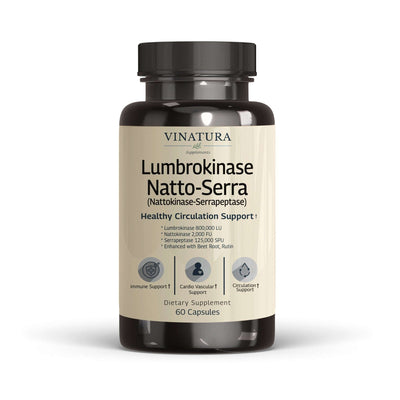
How Much Nattokinase Per Day Should You Take?
Nattokinase is an enzyme produced during the fermentation process of soybeans by adding Bacillus subtilis strain. It is known for its ability to dissolve fibrin, improve blood flow, and benefit health.
However, do you know: "How Much Nattokinase Per Day Should You Take?". Specific dosage, how to use it, and side effects to be aware of will be presented below; please refer.
Before exploring further, please read the disclaimer located at the end of this webpage.
Key Takeaways
- Nattokinase is recommended to be consumed at 100mg/day, equivalent to 2000 fibrinolytic units FU.
- It should be used regularly every day, prolonged for 8 weeks.
- Take Nattokinase on an empty stomach in the morning or evening, depending on your schedule.
- Nattokinase may cause side effects if consumed indiscriminately or in excess, notably including Difficulty breathing, chest pain, mucosal bleeding, anaphylactic shock, hives,...
- Nattokinase can be supplemented with capsules, tablets, powder, or consumed as a traditional Japanese Natto dish.
How Much Nattokinase Per Day Should You Take?

Nattokinase is an enzyme fermented from Japanese natto soybeans by Bacillus natto bacteria. It dissolves fibrin, helps improve blood flow. Nattokinase benefits the cardiovascular and circulatory systems.
The daily recommended dose of Nattokinase is 100mg/day (equivalent to 2,000 fibrinolytic units - FU), used continuously for 8 weeks [1] [2].
The dosage of Nattokinase also depends on health conditions, consumption purpose, and individual allergic reactions. Do not forget to consult a doctor or healthcare professional to discuss your case.
Read more: Nattokinase Drug Interactions & Nattokinase Contraindications
Side Effects May Happen When Overdose Nattokinase

When consumed at a daily dosage of 100mg, Nattokinase is safe, and no study has yet found any side effects or potential risks when used [3].
However, if consumed in high doses or indiscriminately, Nattokinase can cause some serious side effects as follows:
- Difficulty breathing, mild chest pain, and blood clots on mechanical valves requiring valve replacement for patients who arbitrarily replace Nattokinase with Warfarin vitamin K antagonists after aortic valve replacement [4].
- Mucosal bleeding leads to death in cases using non-prescription Nattokinase to support conditions such as atrial fibrillation and essential hypertension without other anticoagulant drugs [5].
- Anaphylactic shock caused by soy allergy [6].
- Hives [7].
- Arm blood vessel necrosis when arbitrarily supplementing Nattokinase for Peyronie's disease rehabilitation, leading to amputation in a male patient [8].
- Increased intracranial hemorrhage risk when combined with Aspirin [9].
- Increased bleeding risk when used with anticoagulant drugs, fibrinolytic drugs, and platelet inhibitors [10][11].
Patients with coagulation disorders or taking anticoagulant drugs, fibrinolytics, and thrombolytics should avoid using Nattokinase [12].
On the other hand, the mechanism of action of Nattokinase is to break off blood clots [13].
Sometimes, during the movement, the blood clot may get stuck somewhere else; people with a history of venous thrombosis should consider it when using it.
Learn more: Nattokinase vs Aspirin: Natural or Pharmaceutical Blood Thinners?
When to Take Nattokinase Supplements?
Currently, no specific research declares the appropriate time to consume Nattokinase. However, you can consume Nattokinase every day [14], at any time that is most beneficial for you, either in the morning or evening.
Remember, Nattokinase should be consumed on an empty stomach in the morning or evening [15]. This protein-digesting enzyme acts like a digestive enzyme to help the body consume food. Therefore, if used with meals, it may reduce the effect of Nattokinase.
How to Take Nattokinase Supplements Effectively

The best way for the body to receive this enzyme's maximum benefits is to supplement regularly at the correct dosage.
You can use nattokinase extracted, refined, and conveniently packaged as dietary supplements, but choose a reputable brand with high-quality Nattokinase supplements.
Apply basic principles when supplementing dietary supplements, adhere to the dosage, and how to use printed on the product label.
Experts all accurately research the dosage and irritants, so it's safe. Consult a doctor for the most accurate answer for your health condition.
Additionally, you can supplement the traditional Japanese Natto food with Nattokinase.
However, as a fermented product, its natural taste may be difficult for some to eat.
If eating natto, supplement about 50 grams to absorb the recommended amount of Nattokinase.
Conclusion
As an enzyme, Nattokinase offers benefits for health; however, to maximize its benefits and ensure safety, it needs to be used correctly at the recommended dosage.
This article hopes to have provided the information you were looking for while helping you answer the question: How Much Nattokinase Per Day Should You Take?
References
- [1] Chen, Hongjie, et al. "Nattokinase: A Promising Alternative in Prevention and Treatment of Cardiovascular Diseases." Biomarker Insights, vol. 13, Jan. 2018, p. 117727191878513, https://doi.org/10.1177/1177271918785130.
- [2] Ero, Michael, et al. "A Pilot Study on the Serum Pharmacokinetics of Nattokinase in Humans Following a Single, Oral, Daily Dose. | Alternative Therapies in Health & Medicine | EBSCOhost.” Openurl.ebsco.com, 1 May 2013, openurl.ebsco.com/EPDB%3Agcd%3A7%3A935991/detailv2?sid=ebsco%3Aplink%3Ascholar&id=ebsco%3Agcd%3A87434325&crl=c. Accessed 6 May 2024.
- [3] Weng, Yunqi, et al. "Nattokinase: An Oral Antithrombotic Agent for the Prevention of Cardiovascular Disease." International Journal of Molecular Sciences, vol. 18, no. 3, 28 Feb. 2017, www.ncbi.nlm.nih.gov/pmc/articles/PMC5372539/, https://doi.org/10.3390/ijms18030523.
- [4] ---. "Nattokinase: An Oral Antithrombotic Agent for the Prevention of Cardiovascular Disease." International Journal of Molecular Sciences, vol. 18, no. 3, 28 Feb. 2017, www.ncbi.nlm.nih.gov/pmc/articles/PMC5372539/, https://doi.org/10.3390/ijms18030523.
- [5] Ramachandran, Lintu, et al. “Nattokinase-Associated Hemoperitoneum in an Elderly Woman.” Cureus, 1 Dec. 2021, https://doi.org/10.7759/cureus.20074. Accessed 20 Oct. 2022.
- [6] Kayo Awatani-Yoshidome, and Takashi Hashimoto. "Anaphylaxis from Nattokinase in a Patient with Fermented Soybean (Natto) Allergy." Sciencedirect, Jan. 2022, www.sciencedirect.com/science/article/pii/S1323893021000927?via%3Dihub. Accessed 6 May 2024.
- [7] Fukuda, R, et al. "Urticaria due to Natto (Fermented Soybeans)." Clinical and Experimental Dermatology, vol. 46, no. 5, 28 Feb. 2021, pp. 932–934, academic.oup.com/ced/article-abstract/46/5/932/6598417?redirectedFrom=fulltext&login=false, https://doi.org/10.1111/ced.14590. Accessed 6 May 2024.
- [8] Yang, David, et al. "Vascular Necrosis of the Upper Extremity after Self-Treatment for Peyronie's Disease." Sexual Medicine, vol. 9, no. 1, Feb. 2021, p. 100282, https://doi.org/10.1016/j.esxm.2020.10.010. Accessed 14 May 2022.
- [9] Chang, Yung-Yee, et al. "Cerebellar Hemorrhage Provoked by Combined Use of Nattokinase and Aspirin in a Patient with Cerebral Microbleeds." Internal Medicine, vol. 47, no. 5, 2008, pp. 467–469, www.jstage.jst.go.jp/article/internalmedicine/47/5/47_5_467/_article, https://doi.org/10.2169/internalmedicine.47.0620. Accessed 7 July 2023.
- [10] Kurosawa, Yuko, et al. "A Single-Dose of Oral Nattokinase Potentiates Thrombolysis and Anti-Coagulation Profiles." Scientific Reports, vol. 5, no. 1, 25 June 2015, p. 11601, www.nature.com/articles/srep11601, https://doi.org/10.1038/srep11601. Accessed 18 July 2022.
- [11] Zhang, Fuming, et al. "Interactions between Nattokinase and Heparin/GAGs." Glycoconjugate Journal, vol. 32, no. 9, 28 Sept. 2015, pp. 695–702, https://doi.org/10.1007/s10719-015-9620-8. Accessed 29 Oct. 2019.
- [12] Tai, Ming-Wai, and Burgunda V. Sweet. "Nattokinase for Prevention of Thrombosis." American Journal of Health-System Pharmacy, vol. 63, no. 12, 15 June 2006, pp. 1121–1123, https://doi.org/10.2146/ajhp050509. Accessed 25 Oct. 2019.
- [13] ---. "Nattokinase: An Oral Antithrombotic Agent for the Prevention of Cardiovascular Disease." International Journal of Molecular Sciences, vol. 18, no. 3, 28 Feb. 2017, www.ncbi.nlm.nih.gov/pmc/articles/PMC5372539/, https://doi.org/10.3390/ijms18030523.
- [14] ---. "A Pilot Study on the Serum Pharmacokinetics of Nattokinase in Humans Following a Single, Oral, Daily Dose. | Alternative Therapies in Health & Medicine | EBSCOhost.” Openurl.ebsco.com, 1 May 2013, openurl.ebsco.com/EPDB%3Agcd%3A7%3A935991/detailv2?sid=ebsco%3Aplink%3Ascholar&id=ebsco%3Agcd%3A87434325&crl=c. Accessed 6 May 2024.
- [15] Zhao, Yong Liang, et al. "The Changes of Fibrinolytic Activity of Nattokinase in Artificial Gastrointestinal Environment and Human Digestive Juice." Advanced Materials Research, vol. 581-582, 2012, pp. 1145–1150, www.scientific.net/AMR.581-582.1145, https://doi.org/10.4028/www.scientific.net/AMR.581-582.1145. Accessed 6 May 2024.
Author

Product Disclaimer
Including an ingredient or study does not evaluate, endorse, or recommend any Vinatura product or any third-party product. Some ingredients discussed may not be used in any Vinatura product.
The content of the articles has not been evaluated by the Food and Drug Administration (FDA) and is not intended to promote or endorse any specific product. Any products sold on this website are not intended to diagnose, treat, cure, or prevent any disease.
Opinions and Endorsements
Any claims, statements, or opinions expressed in the articles are those of the author(s) and do not necessarily reflect the views or opinions of the manufacturers of the dietary supplement products. The products sold on this website are separate from the content of the articles and are not directly endorsed or associated with the information presented here.
Liability Disclaimer
The author(s) of the articles, website, and manufacturers of the dietary supplement products do not assume any liability for any potential consequences arising from the use of the information provided in the articles. Ingredient effects, dosages, and safety vary by individual, formulation, and context; some ingredients interact with medications or may be unsuitable during pregnancy or lactation. It is recommended that individuals consult with a qualified healthcare professional before making any dietary or lifestyle changes, including the use of dietary supplements.
Product Usage
Please refer to the product labels and packaging for specific usage instructions and guidelines for the dietary supplement products sold on this website.
Customer Support
For any concerns or questions regarding the dietary supplement products, please contact our customer support team, who will be more than happy to assist you.





Leave a Comment
Be the first to comment.
What do you think?